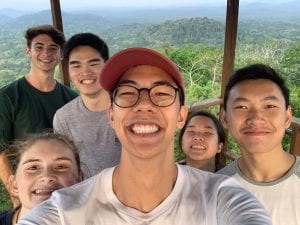Today’s general agenda: project leaf diversity —> project mutualism —> bird tower
Having given my presentation on ants, I was beyond excited that we were going to focus on ants even more on this trip! In particular, today, we were tasked to examine the relationship between Azteca ants and Cecropia trees. These two different species form a mutualistic relationship where both parties benefit by working together. The ants get food while the tree gets protection. We wanted to know how Cecropia trees, before hosting these ants, protect themselves from being eaten.
click for video showing the Azteca ants and Cecropia trees
We have been constantly examining organisms on the ground that we decided to change up our perspective this evening. Near the research station is a bird tower that is three stories high. From the bird tower, we got to observe the Chiquibul forest in its entirety. We also got to see the Belize sunset. I don’t know if it was the wind, the greenery, or sunset, but, in the moment, I never wanted to get off the tower. Of course, all good things have to come to an end, so we turned on our headlamps and hiked back.

As I was carefully walking in the front, I hear Pierce call out “snake!” in the back. The snake turned out to be a venomous jumping viper hidden in the leaf litter! Though the snake was small in length, we did not want to take any risks. We kept our distances and safely moved forward.
Each night, as you may know, we give presentations that focuses on either specific taxonomic groups or topics. Today, Liz addressed tropical diseases. I was excited to learn more about Dengue Fever because the disease is somewhat prevalent in Taiwan. We even talked about how climate change can affect Dengue Fever. In short, climate change can exacerbate Dengue Fever and increase its range.
Brendan Wong
Las Cuevas, Belize
5/19/2019
